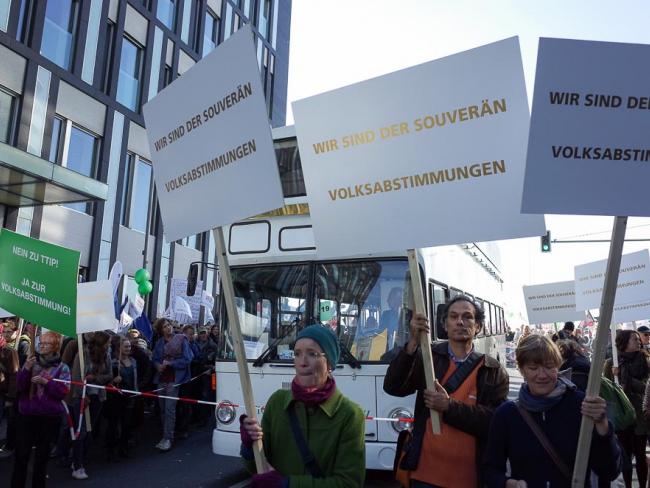18 October 2015

250,000 marched in the giant demonstration in Berlin against TTIP on 10 October. Placards shown say "No to TTIP" and "We are sovereign", and call for a referendum on the treaty. Photo Lucas Rosenthal (CC BY SA 2.0)
Opponents of TTIP, the Transatlantic Trade and Investment Partnership treaty currently being negotiated on our behalf by the European Union, have consistently noted how secretive and undemocratic the process is. Just how undemocratic has been shown in startling manner by an interview between John Hilary from War on Want and trade commissioner Cecilia Malmström.
When Hilary challenged Malmström over the extent of opposition, as witnessed by more than three million signatures on a Europe-wide petition against the deal – not to mention a 250,000-strong demonstration in Berlin earlier in October – she replied, “I do not take my mandate from the European people.”
No indeed. She takes it from the transnational corporations which stand to benefit.
‘Total lack of transparency’
Declared opponents are not the only ones outraged by the negotiation process. Interviewed in September by French regional newspaper Sud Ouest, France’s minister for foreign trade, Matthias Fekl said that the “total lack of transparency” posed “a democratic problem”.
In particular, Fekl said that members of the US Congress had “access to a much higher number of documents than we do in Europe”. He also revealed that members of European parliaments could only get to read the negotiating texts in secure rooms in US embassies.
“Europe has offered many compromises, and has received no serious offers from the Americans in return.”
“Europe has offered many compromises, in all areas, and has received no serious offers from the Americans in return,” Fekl added. “Neither for access to their public markets, nor for access to their agricultural and food markets, which remain closed.”
And he went further, saying that France could walk out of the TTIP talks altogether. According to German newspaper Die Zeit, this makes him the first government minister of an EU member state to talk openly about the possibility of the TTIP negotiations collapsing entirely.
Behind schedule
Initially those negotiating the deal were hoping to get an outline agreement by the end of the year. That looked like a modest target back in 2013 when EU member states gave the European Commission the green light to start talking to the US about TTIP. Now it is looking ludicrously optimistic.
The Economist noted on Saturday 17 October, “The TTIP negotiations have slowed to a crawl; even the discussions on tariff elimination, which was supposed to be the easy bit, have dragged.” According to the website Politico, which said it had seen an internal Commission report, the US and the EU have not even exchanged positions on 10 of the TTIP’s 24 “chapters”, which each cover different areas – let alone started to negotiate.
Meanwhile, reports from Washington suggest that the European Union is already dropping its standards ahead of a TTIP agreement. The newsletter Washington Trade Daily said that EU trade counsellor Damien Levie told a free-market US think tank that genetically modified crops and chemically washed beef carcasses were already being allowed into the EU. The news will do nothing to dispel anxiety throughout Europe that TTIP will involve a collapse of environmental standards in a capitulation to large-scale US agriculture companies.
On Sunday (18 October) anti-TTIP rallies also took place in 50 Spanish cities.
